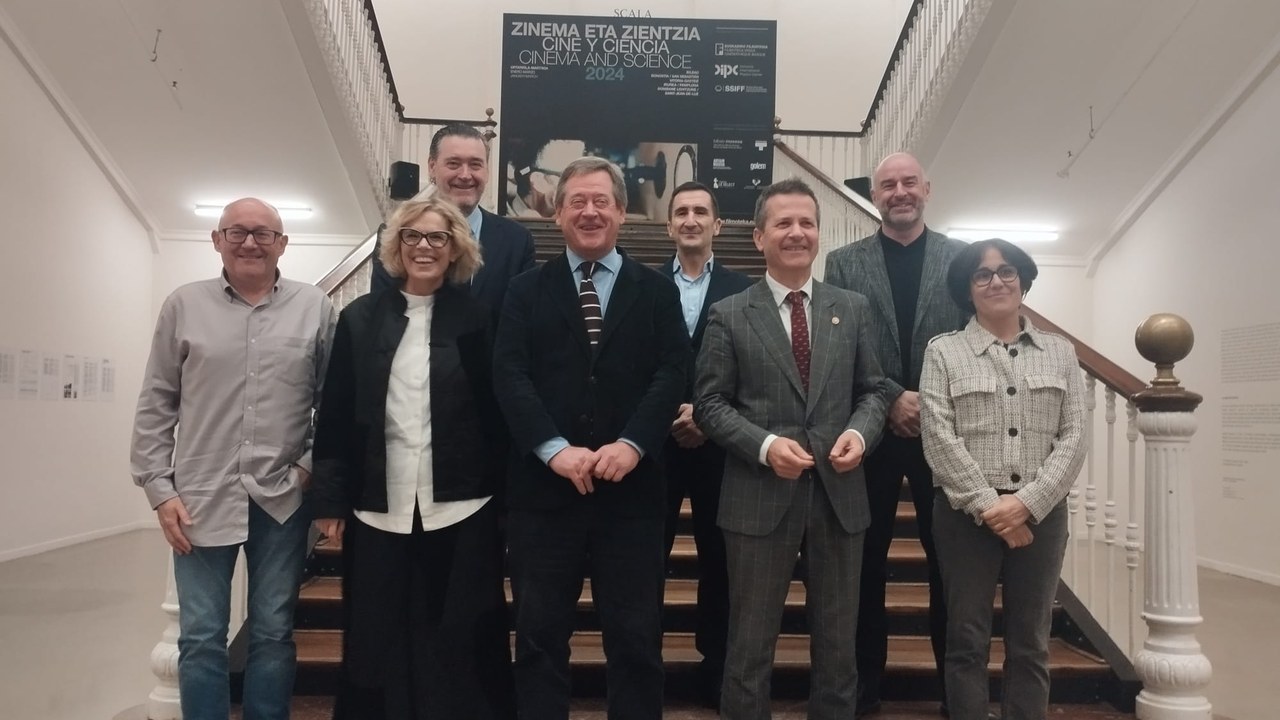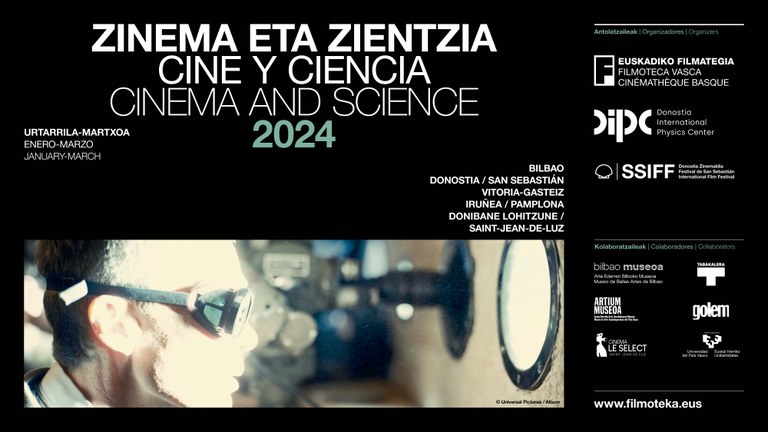The seventh edition of the Cinema and Science series proposes to delve into the deepest scientific dilemmas through ten films.
Twenty scientists will debate with the public in the screenings that will take place between January and March in Vitoria-Gasteiz, San Sebastian, Bilbao, Pamplona and Saint Jean de Luz.

Program Events and tickets Trailer
The seventh edition of the Cinema and Science series proposes to delve into the deepest scientific dilemmas through ten films that will be screened between January and March in Vitoria-Gasteiz (Artium Museoa), San Sebastian (Tabakalera International Center of Contemporary Culture), Bilbao (Bizkaia Aretoa-Sala Mitxelena of the UPV/EHU), Pamplona (Golem Baiona Cinemas) and Saint Jean de Luz (Cinéma Le Sélect). In addition, the public will have the opportunity to debate with scientists of international prestige on issues such as the atomic bomb, artificial intelligence or the aging of the population.
 Poster of the seventh edition of Cinema and Science.
Poster of the seventh edition of Cinema and Science.
Organized by the Basque Film Archive, the Donostia International Physics Center (DIPC) and the San Sebastian International Film Festival, the series aims to transmit cinematographic and scientific culture. According to Joxean Fernández, this seventh edition will often deal with "the dilemmas and struggles" faced by the different scientific communities "in very specific historical and geographical contexts". "Names such as Robert Oppenheimer, Hedy Lamarr or Ignaz Semmelweis, among others, will play a leading role in a series that combines classic, contemporary, fiction, non-fiction and animation films, and where the selection criterion is always the cinematographic quality, as well as the possibility that the films can also be discussed with scientific perspective," he stressed.
For his part, Díez Muiño has focused on the popularity of this series. "It is only increasing. In the year that the fascinating life of physicist Robert Oppenheimer has been shown on screens all over the world, we want to show that the dialogue between cinema and science can be approached from different perspectives and that all of them are attractive and enriching. This cycle reveals the complexity and beauty of the relationship between two such creative activities as cinema and science," he added.
Minister Zupiria stressed that this cycle is the result of collaboration between different entities: "we can say that in our cultural ecosystem, collaboration between different institutions is an added value and something that is ingrained in our way-of-working. Many interesting projects that generate new values and knowledge are born out from this collaboration, including this cycle that we present today. This event, or rather, these events related to science and cinema, allow us to satisfy our curiosity or perhaps, who knows, awaken it.
Finally, the Minister of Education, Jokin Bildarratz, pointed out that this cycle fulfills one of the main objectives of the Department of Education, which is the communication of science. In this regard, he referred to various initiatives that the department promotes annually to disseminate scientific knowledge and the work of scientists, such as the Passion for Knowledge festival or Naukas, Science Show, Zientzia Kalean and Zientzia Ikasgelan. "It is clear that the Cinema and Science series aims the same thing: to communicate science in an entertaining way," he said.
FILMS AND SPEAKERS
The cycle will begin on Thursday, January 11th with the screening in Vitoria and San Sebastian of Oppenheimer (Christopher Nolan, 2023), a film that will provide an insight into the history of the creation of the atomic bomb and the dilemmas that arose from this discovery. The film will be presented at Tabakalera (January 11th), in Bilbao (January 13th) and in Pamplona (January 16th) by physicist Pedro Miguel Etxenike, president of the DIPC and a great expert of the biography of the American physicist Robert Oppenheimer. To celebrate this unique occasion, Professor Etxenike will give a lecture prior to the screenings (at 18:00), while the screenings will take place at their usual time (19:00).
Semmelweis (André de Toth, 1940) highlights the figure of Ignaz Semmelweis, a physician who pioneered antiseptic procedures and took on the medical community of the mid-19th century in an attempt to save the lives of many women who died after giving birth. Plan 75 (Chie Hayakawa, 2022), which passed through Cannes two years ago, raises the question of the aging of society; while Bombshell: The Hedy Lamarr Story (Alexandra Dean, 2017) recovers the story of this classic Hollywood actress whose role as a researcher remained in the shadows, despite having been the precursor of long-distance wireless communications.
Two classic movies starring some of the most important names in the history of cinema will also be screened: Memories of Africa (Sydney Pollack, 1985), in which Meryl Streep and Robert Redford show us the greatness of the wild; and Bringin up Baby (Howard Hawks, 1938), a delightful comedy starring Katharine Hepburn and Cary Grant.
In 1986, Vicente Aranda brought to the big screen Tiempo de silencio, the classic novel by writer and doctor Luis Martín-Santos, whose 100th birthday will be celebrated in 2024. The Perfect Storm (Wolfgang Petersen, 2000) will talk about meteorology, and the animated film Mars Express (Jérémie Périn, 2023) will deal with artificial intelligence. This subject is also addressed by the film signed by the German filmmaker Werner Herzog that will close this edition of the Cinema and Science series: Theater of Thought (2022).
The whole program will be screened in San Sebastian, Bilbao, Vitoria-Gasteiz and Pamplona, while in Saint Jean de Luz we will be able to enjoy La vie du Dr. Semmelweis, Out of Africa, Mars Express, L'Imposible Mr. Bébé and Oppenheimer.
The presentations will be given by: Javier Aizpurua (physicist at DIPC and Ikerbasque), Itziar Alkorta (biochemist at UPV/EHU), Amaia Bernaras (computer engineer at Euskadi Technology Park), Igor Campillo (physicist at Euskampus and DIPC), Fernando Cossío (chemist at UPV/EHU and Ikerbasque), Pedro Miguel Etxenike (physicist at DIPC and UPV/EHU), Aitzol García Etxarri (physicist at DIPC and Ikerbasque), Maia Garcia-Vergniory (physicist at DIPC and Max Planck Institute for Chemical Physics of Solids), Miguel Ángel Goenaga (physician at Hospital Universitario Donostia), Mari Luz Guenaga (computer engineer at the University of Deusto), Ane Insausti (telecommunications engineer at Fundación Mubil-Gipuzkoa Provincial Council), Ignacio López-Goñi (microbiologist at UNAV), Maialen Martija (physicist at Euskalmet/Tecnalia), Idoia Mujika (chemist at Centro de Física de Materiales CFM CSIC-UPV/EHU), Juan Ignacio Pérez Iglesias (biologist at UPV/EHU and DIPC), Onintze Salazar (physicist at Euskalmet/Tecnalia), Itziar Vergara (physician at IIS Biogipuzkoa), Rafael Yuste (neurobiologist at Columbia University), Didier Roux (physicist and chemist at l'Académie des Sciences et des Technologies) and Ricardo Díez Muiño (physicist at DIPC and Ikerbasque).
OTHER ACTIVITIES
Finally, the morning sessions aimed at schools will be held in San Sebastian, Bilbao and Vitoria, where Mars Express (Jérémie Périn, 2023) will be screened, subtitled in Basque and presented by Rodrigo Agerri and Izaskun Etxeberria, from the Hitz research group of the UPV/EHU.
Tickets can be purchased on the websites and at the ticket offices of Tabakalera, Artium Museoa, the Bilbao Fine Arts Museum (the sessions are moved to Bizkaia Aretoa because of the works in the art gallery) and the Le Sélect and Golem-Baiona cinemas. The price of each ticket is between 3.50 and 6 euros (not including discounts).
